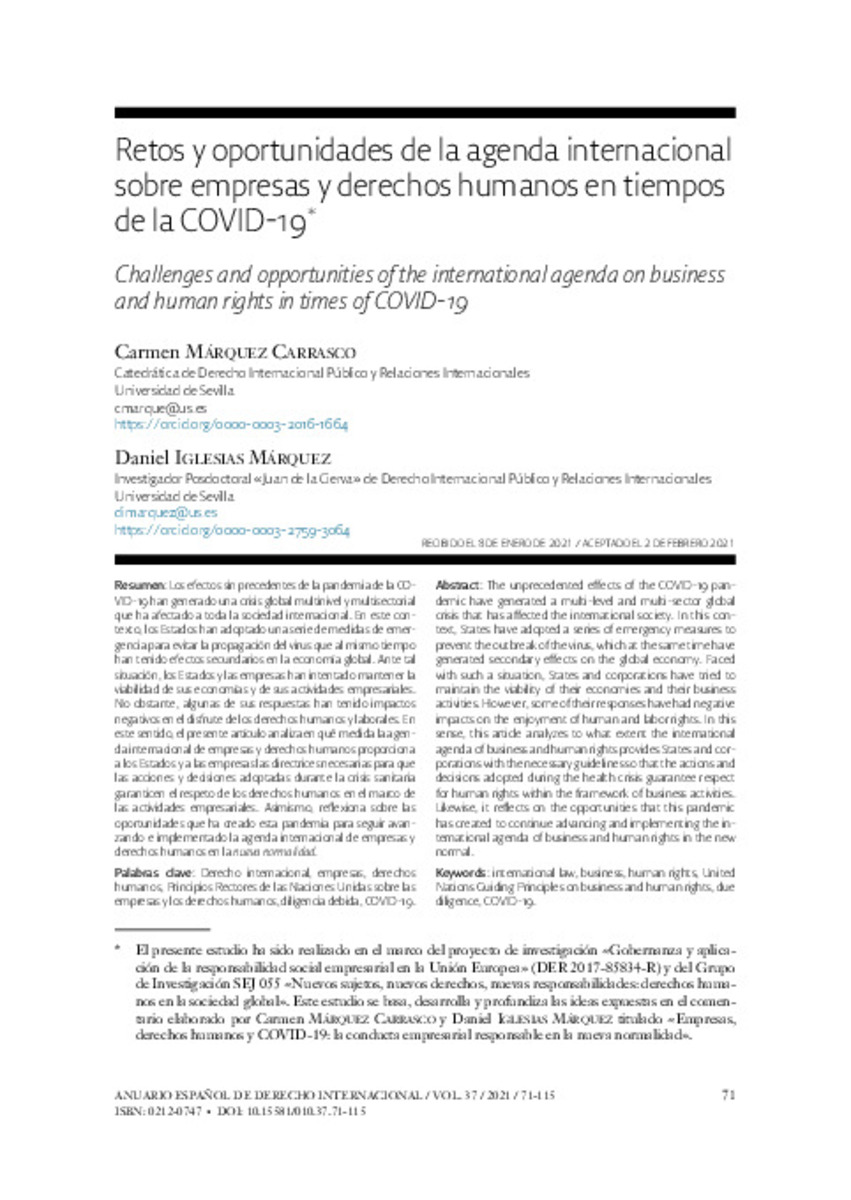Full metadata record
| DC Field | Value | Language |
|---|---|---|
| dc.creator | Márquez-Carrasco, C. (Carmen) | - |
| dc.creator | Iglesias-Márquez, D. (Daniel) | - |
| dc.date.accessioned | 2021-04-23 | - |
| dc.date.accessioned | 2022-03-29T12:58:24Z | - |
| dc.date.available | 2022-03-29T12:58:24Z | - |
| dc.date.issued | 2021 | - |
| dc.identifier.citation | Márquez-Carrasco, C. (Carmen); Iglesias-Márquez, D. (Daniel). "Retos y oportunidades de la agenda internacional sobre empresas y derechos humanos en tiempos de la COVID-19". Anuario Español de Derecho Internacional. 37, 2021, 71 - 115 | es |
| dc.identifier.issn | 2173-3775 | - |
| dc.identifier.uri | https://hdl.handle.net/10171/63302 | - |
| dc.description.abstract | The unprecedented effects of the COVID-19 pandemic have generated a multi-level and multi-sector global crisis that has affected the international society. In this context, States have adopted a series of emergency measures to prevent the outbreak of the virus, which at the same time have generated secondary effects on the global economy. Faced with such a situation, States and corporations have tried to maintain the viability of their economies and their business activities. However, some of their responses have had negative impacts on the enjoyment of human and labor rights. In this sense, this article analyzes to what extent the international agenda of business and human rights provides States and corporations with the necessary guidelines so that the actions and decisions adopted during the health crisis guarantee respect for human rights within the framework of business activities. Likewise, it reflects on the opportunities that this pandemic has created to continue advancing and implementing the international agenda of business and human rights in the new normal. | en_US |
| dc.description.abstract | Los efectos sin precedentes de la pandemia de la COVID- 19 han generado una crisis global multinivel y multisectorial que ha afectado a toda la sociedad internacional. En este contexto, los Estados han adoptado una serie de medidas de emergencia para evitar la propagación del virus que al mismo tiempo han tenido efectos secundarios en la economía global. Ante tal situación, los Estados y las empresas han intentado mantener la viabilidad de sus economías y de sus actividades empresariales. No obstante, algunas de sus respuestas han tenido impactos negativos en el disfrute de los derechos humanos y laborales. En este sentido, el presente artículo analiza en qué medida la agenda internacional de empresas y derechos humanos proporciona a los Estados y a las empresas las directrices necesarias para que las acciones y decisiones adoptadas durante la crisis sanitaria garanticen el respeto de los derechos humanos en el marco de las actividades empresariales. Asimismo, reflexiona sobre las oportunidades que ha creado esta pandemia para seguir avanzando e implementado la agenda internacional de empresas y derechos humanos en la <em>nueva normalidad</em>. | es_ES |
| dc.language.iso | spa | - |
| dc.publisher | Servicio de Publicaciones de la Universidad de Navarra | es_ES |
| dc.rights | info:eu-repo/semantics/openAccess | es_ES |
| dc.subject | Derecho internacional | - |
| dc.subject | empresas | - |
| dc.subject | derechos humanos | - |
| dc.subject | Principios Rectores de las Naciones Unidas sobre las empresas y los derechos humanos | - |
| dc.subject | diligencia debida | - |
| dc.subject | COVID-19 | - |
| dc.title | Retos y oportunidades de la agenda internacional sobre empresas y derechos humanos en tiempos de la COVID-19 | es_ES |
| dc.title.alternative | Challenges and opportunities of the international agenda on business and human rights in times of COVID-19 | en_US |
| dc.type | info:eu-repo/semantics/article | es_ES |
| dc.identifier.doi | 10.15581/010.37.71-115 | - |
| dadun.citation.endingPage | 115 | - |
| dadun.citation.publicationName | Anuario Español de Derecho Internacional | - |
| dadun.citation.startingPage | 71 | - |
| dadun.citation.volume | 37 | - |
Files in This Item:
Statistics and impact
Items in Dadun are protected by copyright, with all rights reserved, unless otherwise indicated.






